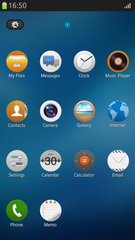Samsung's Tizen Trumps BlackBerry OS - The New Fourth Largest Smartphone Platform
December 29, 2015 • News • Tizen
In the smartphone world, one of the things people frequently hear are operating systems, or better known simply as OS. An operating system is a software that provides common services for computer programs, and therefore important for computer systems to function. There are a number of OS that different smartphones use, with Android, Apple iOS, Windows, and BlackBerry (four largest smartphone platform, from highest to lowest) among the most well known and widely used.

Things, however, changed unfortunately for BlackBerry OS as of third quarter of 2015. New market research report claimed that the fourth largest smartphone platform today is Samsung's Tizen OS, which some people refer to as an "Android clone".
Tizen OS

Tizen OS, first released in early 2012 (3 years ago), is a result of Samsung and Intel's partnership to create an operating system which Samsung Electronics co-CEO J.K. Shin envisions (according to CNET Korea) to be used not only on smartphones, but eventually to vehicles and other industries. Although there are earlier speculations that Samsung might drop the Tizen project, it seems that there is no stopping now for the smartphone giant's "pet project".
Blackberry OS vs Tizen
It is understandable that Blackberry is having a hard time gaining that much needed popularity in an Android/iOS-dominated arena. The company's last handset with its own OS, the Leap, was still struggling to gain a significant rise in popularity, which is probably why the Canadian company has since then been revamping its business by entering the Android scene with its first Android-powered smartphone, the BlackBerry Priv (short for "privacy"). According to Strategy Analytics' Wireless Smartphone Strategies (WSS) service, there was a significant decline in smartphone platform market share with Microsoft's Windows Phone, Mozilla's Firefox and Blackberry OS.
Fortunately for Tizen, its recent launches made a good impact. Starting with the Z1, which made a poor first impression in India, Samsung announced that it had sold 1 million units within six months since its release. Its second Tizen-powered phone, the 5-inch mid-range Z3, also helped boost the OS' popularity, which in the near future might prove to be one of the best alternatives for Android.
